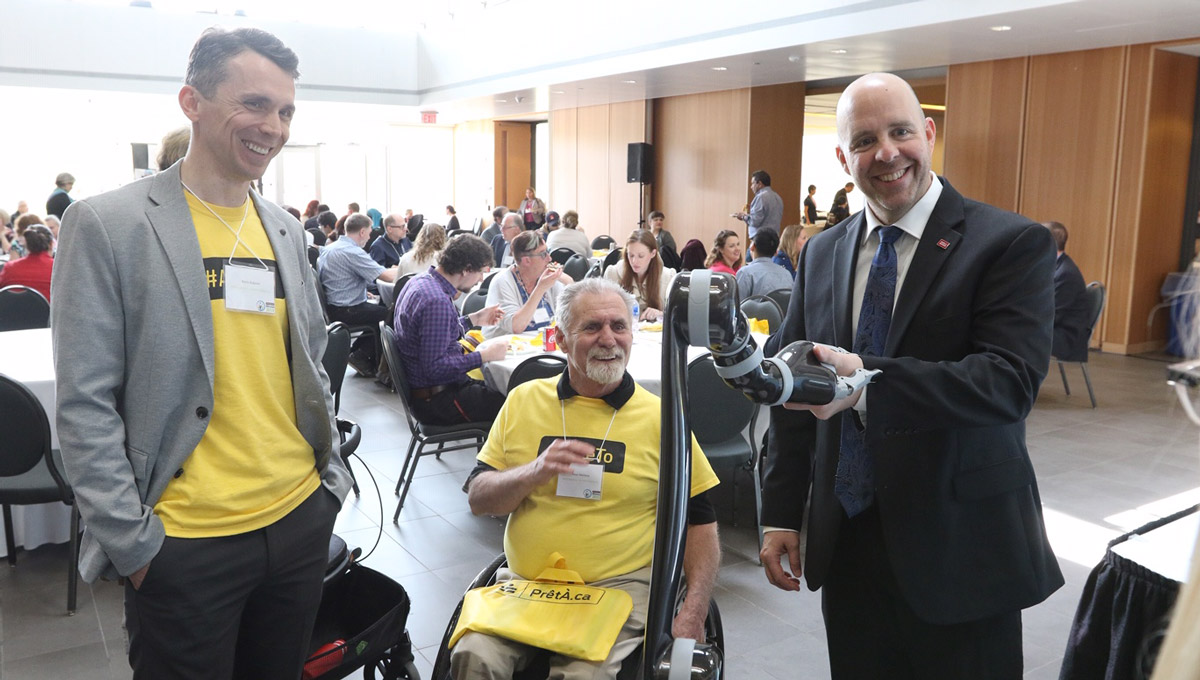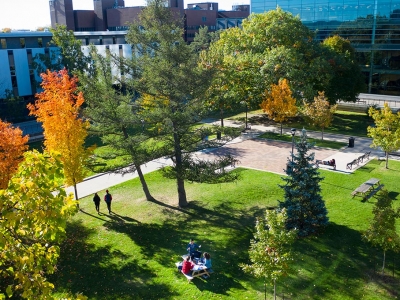By Elizabeth Murphy
From public service champions to tech entrepreneurs, Enable Ottawa provided an engaging collection of experts and industry leaders working in the areas of accessibility and assistive technology at an annual event on May 22, 2019.
With the theme of Technology and Employment, the event was hosted by Carleton University’s READ Initiative, in association with the David C. Onley Initiative and its #AbleTo public awareness campaign. It brought together organizations that promote accessible and inclusive workplaces.
“We already have the potential to make workplaces accessible with the help of technology,” says Boris Vukovic, director of the READ Initiative. “Many mainstream systems and software have accessibility features built in, or enable accessibility through their core functionality.”
Vukovic noted that technology is an effective way to make employment settings more accommodating and ease employer concerns, as well as tackle some myths about burdens of accessibility in workplaces.
“Through our employment initiatives at Carleton and relevant partnerships, we hope to make employers more aware of readily accessible supports and capacity – and to address the notion that adapting workplaces for persons with disabilities is costly and requires very specialized expertise.”
Supporting People with Disabilities in the Workplace
Through a series of discussions, seminars and networking opportunities, guests had opportunities to discover innovative technology and engineering designs, share experiences and learn about best practices that support people with disabilities in the workplace.
Following welcoming remarks from Suzanne Blanchard, vice-president (Students and Enrolment), Carleton alumna Yazmine Laroche, deputy minister of Public Service Accessibility, launched the formal program as she discussed the importance of creating accessibility in the federal public service.
#enableottawa2019 is starting strong with Deputy Minister, Public Service Accessibility, Yazmine Laroche kicking things off – technology and employment for people with disabilities in the work place – life changing. #OnleyInitiative pic.twitter.com/zXPKtOvW5C
— Julie Caldwell (@liveluvlife) May 22, 2019
In addition to a series of engaging speeches, attendees had their pick of fascinating panels organized throughout the day.
Enabling Inclusion, Simple Ways to Connect Employers to Candidates featured experts from the March of Dimes and Neil Squire Society (NSS) who discussed how their programs assist clientele with securing employment and the role of assistive technology in accommodation and job retention.
Challenges and Opportunities
At the Robotics and Their Role as Next Generation Assistive Technologies presentation, representatives from Kinova Robotics talked about assistive robotics, as well as opportunities and challenges presented by these innovative developments.
The audience was wowed by the demonstration of JACO, a portable plug-and-play robotic arm, as it picked up straws from a table and shook hands with Carleton President Benoit-Antoine Bacon.

From left to right: Boris Vukovic, Dean Mellway and President Benoit-Antoine Bacon.
Attendees interested in entrepreneurship as a future career path were drawn to the Entrepreneurship in the Accessibility Space panel. It featured Carleton’s Quayce Thomas, founder of Timsle – an online platform that provides a private accountability network to help people meet their health and wellness goals, and Ke Wang, founder of Eightfold Technology and developer of the Smartchair – a technology that transforms power wheelchairs into smartphone-controlled self-driving vehicles.
The Tetra Society of North America presented Building Solutions Together, a discussion that focused on the process of creating assistive devices. National Program Co-ordinator Eric Molendyk shared his experiences of accessibility in the work environment.
Enhancing Productivity Through the use of Assistive Technologies
The David C. Onley initiative facilitated the Accessibility and Technology in the Workplace, Employer Best Practices panel. Advocates from Shared Services Canada and Fully Managed explored how employers can support employees and enhance productivity through the use of assistive technologies.
The eventful day wrapped up with a networking exhibition open to guests, including students, graduates and employers.
While the event focused on accessibility for people with disabilities, Vukovic noted there are additional benefits to providing inclusive workplaces.
“Innovation in accessibility, whether through technology or inclusive design, can make workplaces more accessible for persons with disabilities, but also benefit others,” says Vukovic. “For example, any effort that makes employment more accessible for persons with mental health disabilities will lead to better workplaces for the mental health of all employees.
“Time and time again, inclusive design has proven to benefit our society as a whole.”
This year’s edition of Enable Ottawa was co-sponsored by the Accessibility Directorate of Ontario, the Institution of Engineering and Technology (IET) and the TETRA Society of North America.
Wednesday, May 29, 2019 in Onley Initiative, READi
Share: Twitter, Facebook



